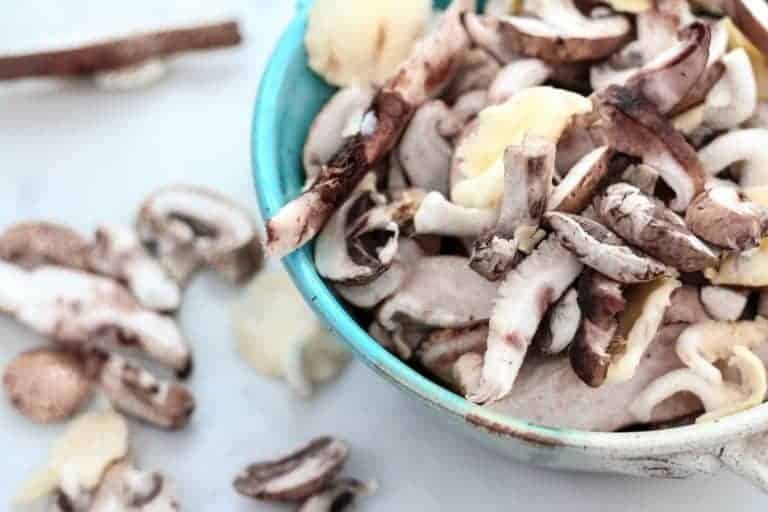When is the Best Time of Day to Drink Kombucha?

Kombucha, also known as Mushroom Tea, has become an immensely popular functional beverage with an impressive laundry list of purported health benefits. It is a fermented tea drink, made by adding a symbiotic culture of bacteria and yeast (SCOBY) to sweetened black or green tea. The result is a delicious brew chock-full of B-vitamins, minerals, antioxidants, enzymes, organic acids, and healthy probiotics.
The tea has been implicated in positive health effects such as increasing the diversity of gut microflora, helping systemic detoxification, enhancing the immune system, aiding digestion and boosting energy levels. One popular question that arises in regards to Kombucha is, when is the best time to drink it?
The best time to drink Kombucha depends on the unique needs and body composition of the person drinking it, but there are some helpful guidelines that give many people great results.
In this article, we’re going to take a look at the reasons to drink kombucha in the morning, afternoon, and night, as well as the benefits of drinking kombucha before or after workouts. We’ll also look at when to drink Kombucha in relation to mealtimes with the goal of maximizing the probiotic benefits.
What Time of Day is Best to Drink Kombucha?
Drinking kombucha in the morning
For some drinkers, Kombucha in the morning is a great energizing tonic to get the day started. Since the tea is made from black or green tea which both contain caffeine, kombucha can be a great substitute for morning coffee for those who are trying to curb the habit or switch things up.
If consuming before meals, morning consumption can help stimulate digestion and prepare the body for a morning meal. However, some people may be sensitive to the heavy probiotic load and the acidity of the drink on an empty stomach, and so prefer to consume it after breakfast. In this case, the drink can aid digestion and alleviate GI symptoms such as bloating and gas.
Drinking kombucha in the afternoon
Afternoon consumption (such as an hour or two after lunch) can help aid digestion and give that 2 pm boost that’s needed to get through the rest of the day. If weight loss or weight maintenance is the goal, drinking ten to fifteen minutes before lunch can stimulate feelings of satiety and prevent overeating. The sour taste and acidity of the drink can help curb appetite and tell the body that a meal is on its way.
Drinking kombucha in the evening
Evening kombucha can be a good option for some people, especially as a substitute for sugary or alcoholic drinks that are common after dinner. Some people drink a serving before bed, claiming it helps them sleep at night and reduces feelings of hunger in the morning. Others who are more sensitive to caffeine may want to limit their drinking to earlier in the day.
Kombucha and Exercise: Before or After Workouts?
Kombucha may have great health and performance benefits for gym-rats and endurance athletes alike. Kombucha is beneficial for active folks because it can support healthy energy levels and help detoxify the body of environmental and metabolic toxins. Its immune system-supporting properties are also very helpful as a result of its probiotic content. Less time being spent fighting off a cold means more time at the gym or practicing a sport. Indeed, according to this study conducted with thirty elite rugby players, daily probiotic supplementation reduced the incidence and duration of infections compared to placebo.
Additionally, as a fermented food loaded with healthy probiotics, Kombucha helps reduce inflammation, which is very beneficial for athletes of all kinds. Decreased inflammation can translate to increased flexibility and increased range of motion, which reduces the risk of muscle and tendon injury.
As we’ll see, there is a case to be made for drinking Kombucha both before and after a workout.
Drinking kombucha before a workout
Some find great results beforehand due to the gut-restoring and energizing properties of the drink. In addition to an energy boost, drinking kombucha before workouts may speed up digestion and help the body utilize the fuel in pre-workout shakes or meals, leading to increased performance and higher endurance levels. In this case, the healthy probiotics and acids contribute to greater nutrient assimilation, so the pre-workout meal calories are more likely to be utilized in an anabolic way and distributed to muscle cells, rather than fat cells. If your stomach agrees, try drinking 1-2 servings thirty to sixty minutes before a pre-workout meal.
Drinking kombucha after a workout
Others may have experimented with this and found it can upset their stomach, especially if when immediately preceding a more strenuous workout. According to health coach Sarah Walls, “I would not recommend it before a workout because there is so much natural carbonation that it may leave the stomach unsettled as you start training”. It may be helpful then to consume the drink after the workout, either with or after the post-workout meal. This can help aid digestion and nutrient absorption of the meal and may help settle an upset stomach produced by an intense period of exercise. This is especially true when the lightly effervescent drink is flavored with ginger, which is well-known for ameliorating negative gastrointestinal symptoms.
Kombucha and Food: Before, After, or During Meals?
According to Dr. Megan Rossi, a Registered Dietitian with a Ph.D. in the area of gut health, drinking kombucha before meals, preferably on an empty stomach, is optimal to maximize the drink’s probiotic benefits. When the drink is consumed in this manner, the beneficial bacteria and yeast are exposed to a less harsh acidic environment in the stomach, allowing for an increased chance of their survival and proliferation. The probiotics could then make their way to the rest of the gastrointestinal tract more easily and effectively situate themselves long term to your benefit.
According to this supportive study conducted in 2011 involving four strains of microbes given in pill-form, probiotic survival was maximized when consumed thirty minutes before or during a meal. The researchers found that probiotics given thirty minutes after a meal did not survive in high numbers, and meals containing fats were preferable for the survival of the bacteria in the acidic conditions of the gut.
Many anecdotal reports from kombucha drinkers speak to the benefits of drinking kombucha right before or during meals as well. This is an especially popular option for those who are trying to aid in digestion and lose weight. If drinking with meals, the drink can stimulate feelings of fullness, so drinking with meals may lead to reduced calorie consumption. Kombucha is an ideal replacement for sugary sodas or commercial sports drinks, which may in part account for its weight-reducing potential.
As with all fermented foods. if you’re a first-time Kombucha drinker, try drinking just one to four ounces to gauge how the body reacts. Probiotic-containing foods may cause GI distress in some individuals who aren’t used to the introduction of new microbes. Gastrointestinal symptoms are common in more sensitive individuals, including constipation, diarrhea, and bloating. Decreasing Kombucha intake, reserving kombucha for after meals only, and staying hydrated can help with these negative symptoms.
Final Thoughts
Overall, it’s a great idea to experiment with different consumption times and find what works best for you. What works well for one person may not work so well for another. No matter the time you decide works best for you, if you really want to bring the probiotic benefits to the next level, I recommend consuming the drink alongside a source of prebiotics to nourish the beneficial microbes. Oftentimes, we just need to be watering the soil of the gut microbial community rather than constantly planting new seeds. Prebiotics such as acacia gum, chicory root, garlic, bananas, and asparagus are excellent, nourishing options.
Just like the time of day to consume kombucha is not agreed upon, there are different recommendations on the maximum amount of consumption per day. Based on a thorough analysis, a common amount in non-sensitive individuals is 8-12 ounces spread throughout the day, with a maximum of 32 ounces per day. According to the CDC’s slightly more conservative recommendation, consuming four ounces per day should lead to no adverse health effects in healthy people. Treating the drink like any other supplement will generally serve you well, the golden rules are not overdoing it and listening to your body.
When deciding, it’s also important to note the sugar, caffeine, and alcohol content. Two-servings can easily contain 20g of sugar depending on the brand, and if the kombucha is homebrewed, the alcohol content may be considerably higher than 0.5% which would not be a great option for before workouts, for instance.
Finally, it is true that no two kombuchas are brewed alike. if the kombucha is homebrewed, be sure the brew was made in a sterile environment, as contamination by pathogenic bacteria can lead to an assortment of different negative GI effects or even food poisoning. Finally, it’s best to avoid kombucha or consult a medical professional if you are pregnant, breastfeeding, or have a compromised immune system.






